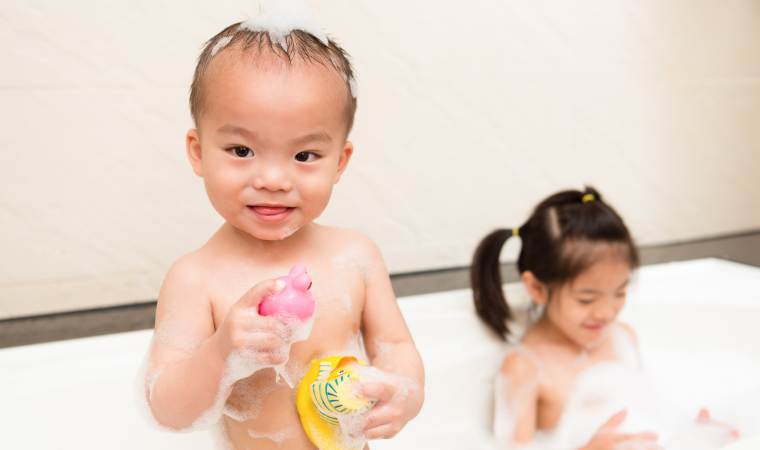Let’s talk about what age you should stop your children from bathing together (or with a parent) as we get a lot of questions about it in my free Facebook sex education group for parents, that parent group.
But first of all, I want to tell you something important.
Please remember that culture has a huge impact on your values, beliefs and attitudes on this topic. Some countries are much more open-minded and comfortable with nudity, and shared showering is seen as being appropriate. Whereas some countries are more conservative around bodies.
This is also a topic that may be triggering for you. Especially if you were sexually abused as a child, as your priority will be to keep your children safe. So in this situation, do what works for your family.
When should adults stop bathing with children?
When either the adult or the child feels uncomfortable about it, then it should stop.
For some parents, this may happen when they notice the kid looking at them in a way that makes them feel uncomfortable. Or they may stop as they notice puberty happening to their child’s body. Fathers (or parents with a penis) will often stop at the start of puberty or avoid bathing with children of a different sex (to them) because of a fear of being accused of paedophilia.
Kids usually let us know when they want privacy, so if they request it, then respect it. Sometimes they don’t request privacy though, so if you ever feel uncomfortable, then stop bathing together.
For safety reasons, children under the age of 6 should be supervised at all times, regardless of whether they’re bathing with an older child or not.

What if the child is of a different sex? (to the parent)
If the child is of a different sex, then again… follow the comfort rule ie it stops when someone feels uncomfortable.
What age should children stop bathing together?
Again, that is up to you. I am unaware of any laws forbidding it, and as long as the bath play is appropriate, and genitals aren’t being handled inappropriately, then it can stop when someone feels uncomfortable. So if the parent feels uncomfortable with it, then it stops. If one child requests privacy, then that should also be respected.
What if the children are of different genders?
I know this is a bit repetitive, but again, it is up to you ie do what feels comfortable for your family. Some families allow children of different sexes to bathe together whereas others don’t. Some families will allow it but underwear has to be worn. Some families will stop it as puberty starts. Every family handles it differently, but if someone feels uncomfortable (child and/or parent), then it needs to stop.

What if the kids are different ages?
When we look at child development, we know that if one child is more than 2 years older (or younger) than the other child, that there is usually a power imbalance. Which means the younger child is vulnerable as they are more likely to go along with whatever the older child suggests.
So…
As long as the children are of a similar age (+/- 2 years) and stage of sexual development, then it is relatively safe. You may also need to talk to them about your family rules in regard to private body parts.
What if they are bathing with someone else’s child?
The safest way to handle children from different families bathing together is to always have parental permission first.
So if the kids get muddy and it is too cold to hose them off outside, call the other parent and ask if it’s okay to throw them into the bath together. If you can’t get hold of them, then bathe them separately.
Or if they are sleeping over at your house, check that the parents are okay with the children bathing together.
And when they are bathing together, just keep a discrete eye on them and intervene if any of their behaviour makes you feel uncomfortable. You may also want to remind them of your family rules about private body parts too!
What if they are showering with a cousin?
Honestly, it doesn’t matter if they are a cousin or a friend. Inappropriate sexual touch will happen regardless of whether children are family or not. And there is a false belief that children are safer with family (they aren’t). So treat cousins as if they were friends bathing together (with all those considerations).
What if they ask why they can’t bathe together?
If it is stopping because one person doesn’t want it to happen, you could say that they want to be private. They are the boss of their body, so they can make these decisions.
If it is stopping because a parent wants it to stop, you could explain that they are now old enough (or grown up enough) to be able to have a bath on their own. This is one of the things that happen as kids grow up, and it happens in other families too.
If it is stopping because the parent of the other child says they can’t, you can explain that different families have different rules. Some families are more private about bodies, so when their friend/cousin comes over, they will need to have a bath by themself, and not together.
Remember: Every family handles bathing differently, so do what works with your family. And if you aren’t comfortable with it, then it’s time for it to stop.


